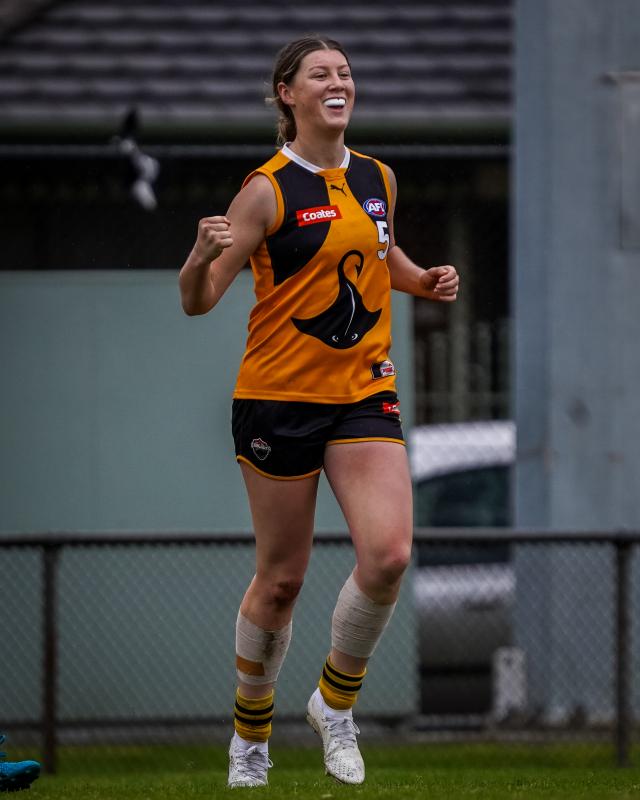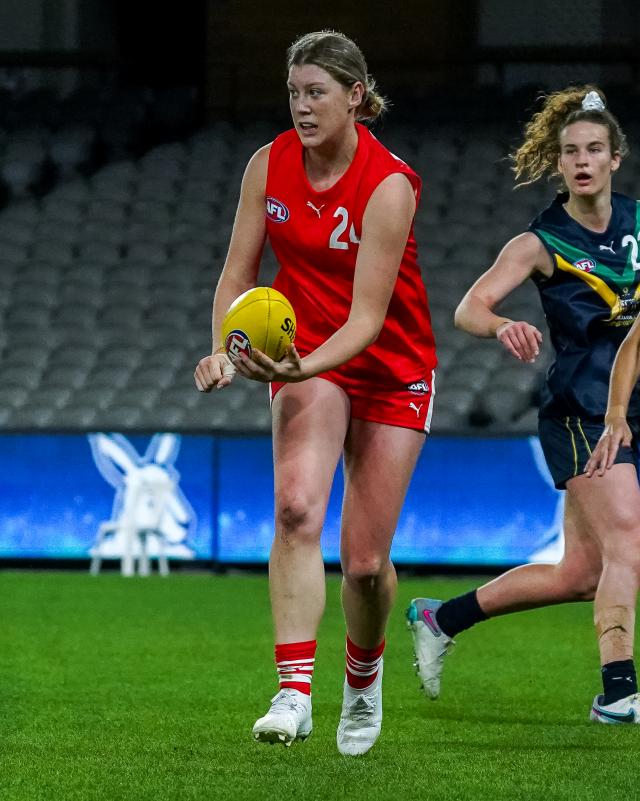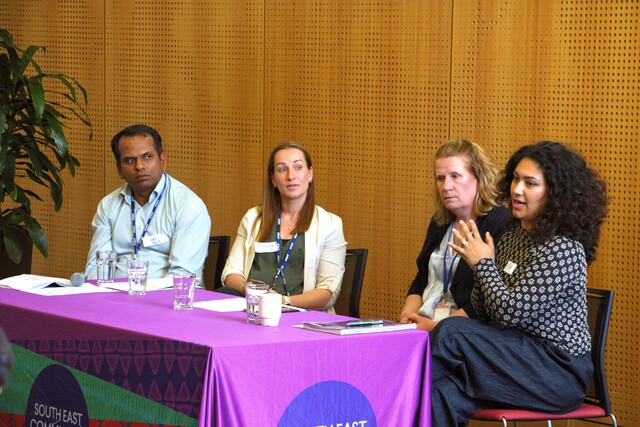PRECEDE
Dandenong Stingrays forward Sophie Butterworth’s 31 goal Coates League season appears to be a stellar effort.
That she did it while battling bilateral popliteal artery entrapment syndrome, initially misdiagnosed as compartment syndrome, lifts it into the realms of absurdity.
Describing the pain at its worst as being like a hot knife slicing your calf, her playing status was almost a week-to-week proposition for her coaching staff to consider.
Yet the only match Butterworth missed all year was the last national championships game, largely due to the long flight to and from Perth.
The powerful marking target persisted through injury to line up every week for Dandenong, one of only four Coates League players to average more than two goals per game given a minimum of four games.
By the end of the year, the left footer was the name opposition coaches would put on their magnet board that needed stopping.
Linked most heavily to Carlton and Hawthorn, she is back training to 100 percent, her physicality having insiders confident she can make an immediate impact.
……………………..
The pain first presented itself for Sophie Butterworth in a lower-level local match in 2022.
Seen as a player that could seamlessly make the transition to the bigger bodies of the top level, this match last April was her first taste of senior footy.
Given her status as one of the region’s finest emerging talents, she was thrown into an unfamiliar midfield position to allow her to have more influence on the contest.
The extra running demanded by the positional switch was what she attributed the pain to.
“I ended up getting the nickname ‘noodles’ because I only lasted two minutes in the last quarter of that game,” Butterworth said.
“My calf cramped up and I ended up leaving the field in crutches – but that was sort of that.
“It all went away after that, there was no real issue for the rest of the year.”
That followed six games for the Stingrays, averaging 1.5 goals per game in the 2022 season, run from January until April.
Her season earned Butterworth selection in the Vic Country summer training hub ahead of her top-aged year.
Keen to give herself a strong launchpad for her top-aged year, Butterworth elevated her training intensity in the pre-Christmas pre-season block last year when her injury begun flaring up again.
Again, that was initially attributed to needing to increase her fitness base, but the soreness persisted throughout preseason.
Once the games started in April, the cause for concern heightened further.
“Round 2, against Geelong was one of the worst times; in the fourth quarter, my right calf starting cramping,” Butterworth said, qualifying that the sensation is not medically known as cramping, but feels similar.
“I felt useless being on the field and started to hobble off so someone could replace me, and then it happened in my left calf and I just collapsed.
“I could not walk.
“It’s a really bad burning pain, like your calf is on fire, and someone has stabbed you and dragged a hot knife through your calf.”
Not long thereafter, she was diagnosed with compartment syndrome.
The diagnosis triggered a six-days-per-week rehabilitation process to progress Butterworth back to full health.
But four months in, despite playing strong footy, her condition had inflamed rather than improved, sparking a repeat appointment.
It was at that appointment that she learned that she had been treating the wrong injury, and was this time diagnosed with popliteal artery entrapment syndrome.
Essentially, the blood flow to both her lower legs was limited.
On Friday 21 July, less than 24 hours before she would line up against the Knights and kick four goals, she underwent a pressure test to reach that diagnosis.
She was injected with a local anaesthetic and four separate needles into her calf, and then exercised for more than an hour to flair up the injury.
“I was doing specific exercises, stretches, compression boots, which made me tired by the end of the day but knowing that’s what I had to do to overcome kept me motivated,” Butterworth said of the period before the correct diagnosis.
“To then get shut down and told it wasn’t compartment syndrome made you go ‘really?’
“‘I’ve been going through all this for four months and it’s not that’.
“It was like a rollercoaster getting told you’ve got this, then you don’t have this, and now you’ve got this.
“It’s good that there’s a diagnosis and to get to the bottom of it was a massive relief.”
The new diagnosis explained why the soreness was persisting, with Butterworth beginning heat therapy to promote blood flow as part of her recovery process.
To keep communication between all stakeholders transparent, Butterworth had a round-table discussion with her parents, Moore, Talent Lead Toby Jedwab and well-being coordinator Kellie Fallon.
A takeout of that conversation was that it would be best to inform her teammates of the situation, Butterworth having previously been careful not to let the injury contaminate her effervescent personality.
“I didn’t want anyone to see me different just because I had the syndrome, so I still came across as the happy chappy girl around the club regardless of what was going on,” Butterworth said.
“Grit and respect are two key things we talk about at Stingrays, and together everyone achieves more, so the last thing you want to do is let down your teammates.
“It was a massive relief of stress and I was like a whole new person after that.”
Butterworth would play the first two national championships games, ultimately ruled out of the third because her painful flight back from the first game in Brisbane would likely be magnified on the longer commute from Perth.
Reasonable during the national carnival, and having also played two VFLW games, it was the last six weeks of the Coates League season where her form swelled.
Attracting more targeted on-field attention than ever before, and often worked over by multiple players, she still found a way to take marks and get involved in scoring chains.
Between rounds 14 and 17 she kicked 16.8 goals and averaged three marks per game, highlighted by a five goal, five goal assist game against Bendigo, and she ran consistent patterns to allow the small forwards to pounce at her feet.
“We were really conscious of not being too one-dimensional and she was still good enough to kick three or four goals each game, but she freed up others as well, so from a coaching and team point-of-view she played her role really well,” coach Josh Moore said.
“Apart from the resting mid, all the other forwards were bottom-agers, so naturally looked up to Sophie and she took some great strides as a leader.
“She likes to bring other forwards into the game so all the other girls love playing alongside her.”
Her drawbacks, according to some, are her work rate and lack of positional versatility; both difficult to address given her fitness issues but very much front of mind.
“Having that versatility about me, I feel like, is the next step,” Butterworth said.
“I’m known as that full forward and a couple of times I was put in the backline and got positive feedback from that so I want to bring that into my game and not just be known as a full forward who can give anything a crack.”
Those privy to the situation from the beginning have been blown away by Butterworth’s resilience.
Frequently throughout the season, she would miss the Tuesday training session, with coaches monitoring her closely on Thursday nights during those times to assess her fitness and she always did enough.
Butterworth is happy to leave the injury in the rearview mirror, a staged recovery helping her return to full training capacity, which she has shown in the Stingrays’ pre-season sessions.
“Having that energy boost and adrenaline to get back out there, and know that everything you are doing now is right and you are on the right track, behind the scenes has been a massive relief,” she said.








